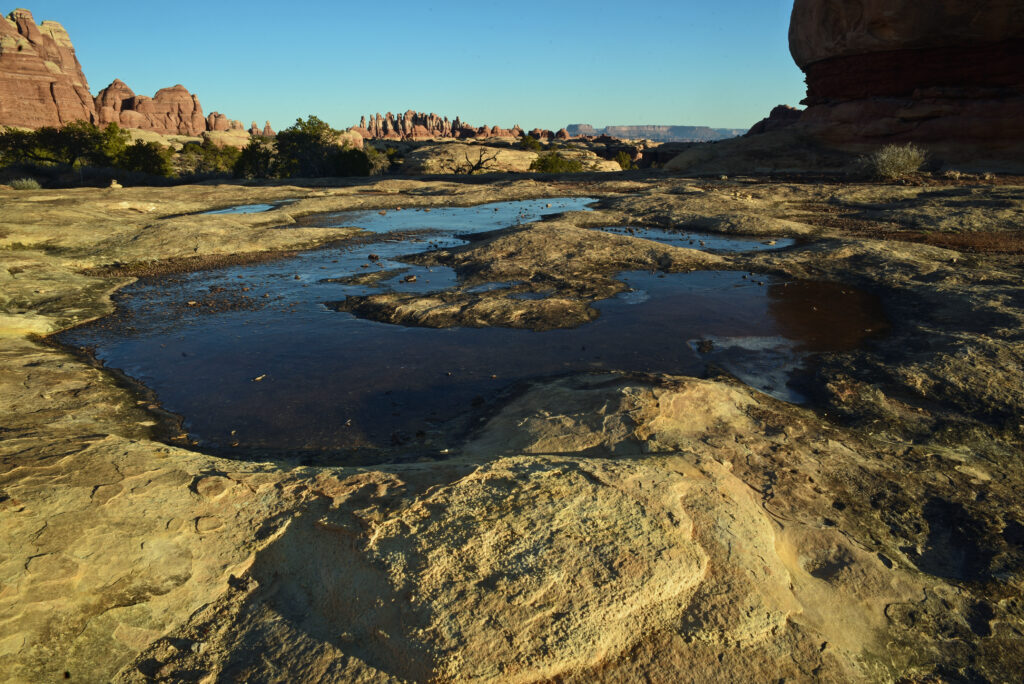
A wind blew out of the canyon and scoured the slickrock. It bellowed and roared all day and into the night, slipping around corners and thrumming against the tent. I burrowed into my sleeping bag, curled up in a ball until the wind died and sleep came.
The following day a breeze swirled, the camp stove flashed, my footsteps pounded the slickrock and a rattlesnake buzzed at my feet. Sometime around sunset, the breeze stopped. I sat on a sandstone bench and looked out at the red hills, the blood orange sunset. When the last chattering bird fell silent, a deep silence followed, and I drank it in.
In the days to come I fired up the stove and tromped around all day, watched red sunsets and sat beneath a blanket of starlight and silence that covered Grand Canyon esplanade. I became lost in that silence and pondered its depth, not so much an absence but a presence – towering, ubiquitous, each night a search for meaning beneath the apathy of stars.
Getting lost is a dying art. Trail signs, GPS, cellphones, SPOT devices, satellite phones, and crowded trails make it hard to really get away. Doug Peacock, author of Walking It Off, once told Outside magazine that “the opportunity to get lost on today’s planet is a privilege.”
I don’t think he meant to go out and do something foolish. He was talking about letting go, leaving the GPS behind and digging in someplace wild. But we live in a culture of distraction, guardrails and litigation.
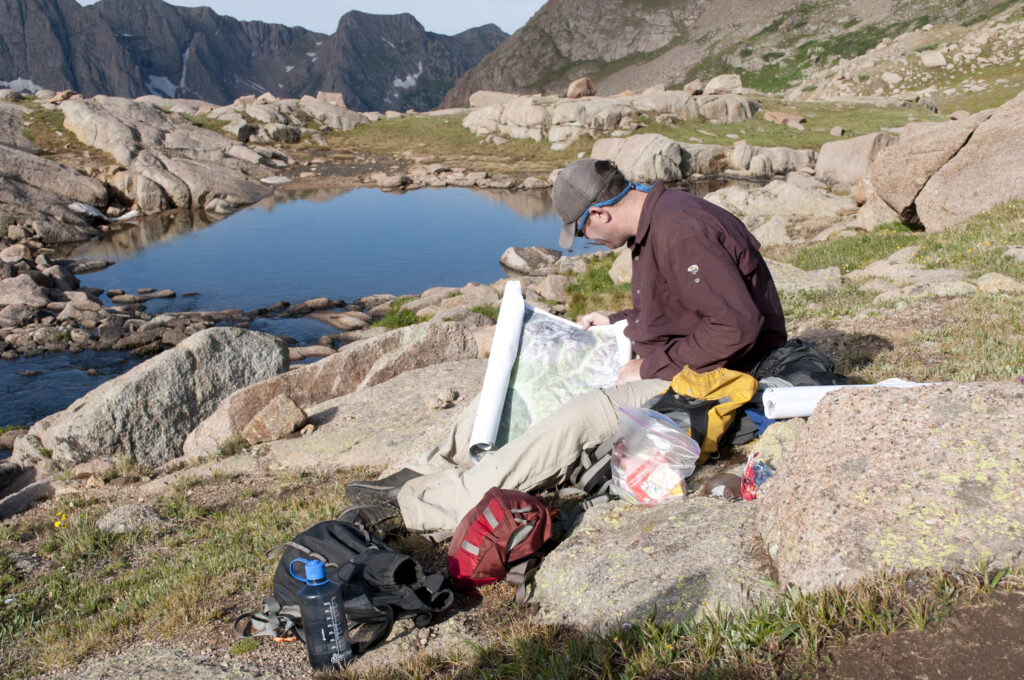
Taking the long way
Those who can navigate reasonably well in the backcountry rarely use the word lost. They chuckle about getting off route or turned around, tell a story about the time they walked 10 miles to cover five, took the scenic route, rolled into camp late for supper. Anyone who spends a lot of time outdoors will eventually do this.
Yet today the backcountry comes to us in guidebooks, websites and cellphones. You can see the results of this culture shift in Search and Rescue reports. The kids get lost, the grownups, too. They don’t just get a little turned around, or slightly off route, show up late for dinner or drive home in the dark. They do not laugh about it on the way back to the truck – they are seriously messed up.
Volunteers fill the ranks of most Search and Rescue teams – able bodied, well-trained men and women who sign up to assist wilderness travelers who have a little bad luck, who turn an ankle or break a leg. But more and more, I hear about calls that reflect a society out of touch with the wild.
The great indoors
People get lost, Search and Rescue rushes to their aid, gets them warm, gives them water, asks questions.
Show me on your map. Where did you lose your way?
“Well, none of them have a map,” said David Bremson, of the Central Arizona Mountain Rescue Association. They have cell phones, which do not work in the backcountry. “People are becoming more and more isolated from the outdoors because of the amount of time they spend indoors.”
You could blame guidebooks, or cellphones, or GPS, but plenty of people use all of these things and don’t have a problem out there. Something else has caused this shift. All that time spent indoors affects how we experience the world around us; the way we drive with our hair on fire to the trailhead, the cell signal we had at the parking lot, the trail signs, kiosks, the way we think, the way we walk – head down, keep moving, no time to stop: higher, farther, faster, more! We shrink our internal map, bit by bit. Later, on the trail, we find out what the big world really looks like.
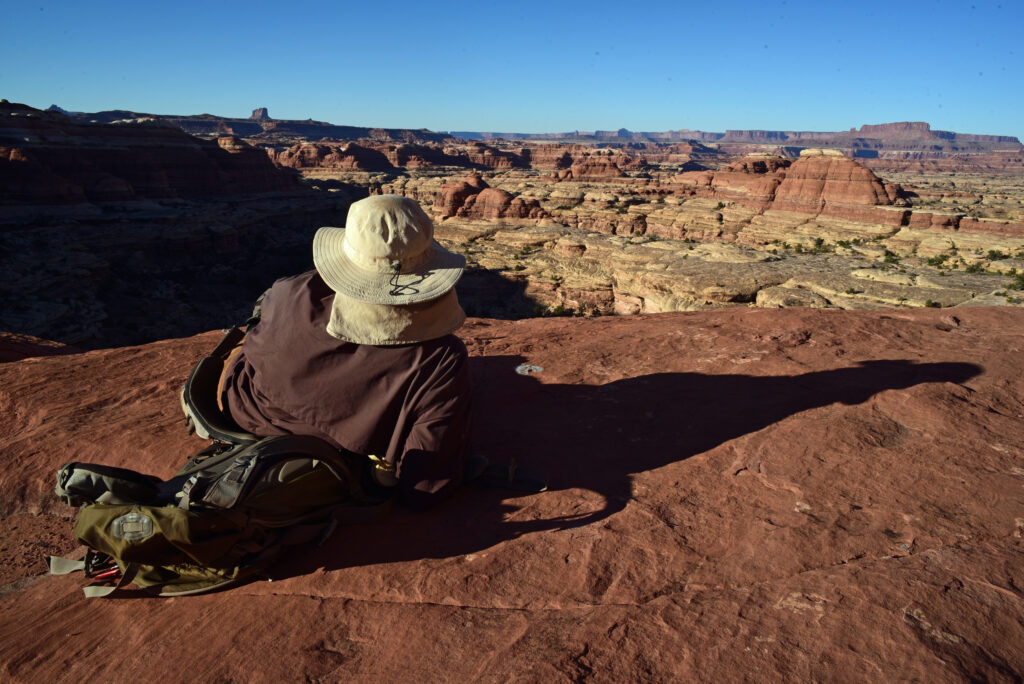
A short history of travel
People travel for many reasons, Tristan Gooley writes, and “not every journey has a grand purpose.” People have always traveled – to find game, new cropland, water, to make love or war, to claim new ground, find gold, or silver, to flee prosecution, to see what lies beyond yonder mountain. The Greeks and Romans traveled to view art, or temples, to see the sights in foreign lands. On the Micronesian island of Puluwat, the men get drunk and sail for the neighboring island of Pikelot, “singing and shouting” as their wives scowl along the shore.
Humans have navigated in a variety of ways throughout history – following stars, songs, landmarks and maps. Paper maps replaced internal maps as mankind expanded his range. In Alaska, the natives used landmarks to navigate, but American explorers discarded native names and replaced them with tributes to patrons, relatives, prospectors. The late Sherry Simpson writes that these new place names “mean almost nothing to anyone walking the earth today.”
The same story unfolded throughout the West, where explorers filled their maps with names of soldiers and benefactors, but also, a stew of Spanish, Ute, Navajo, Apache, and other tongues. Some appear to have a random, slapped on appearance, while others merely state the obvious: Rattlesnake Canyon, Sycamore Creek, Hell’s Hole, Hell’s Half Acre, Hell’s Gate, Hell’s Bells, Mollie’s Nipple.
A seismic change
We pack our bags, dream of distant shores, move from one place to the next, but things change, navigational devices come and go, the world shrinks as we shift our focus from the hills to something in our hands. Each device brings with it a “seismic change in the relationship between the navigator and the natural world,” Gooley writes.
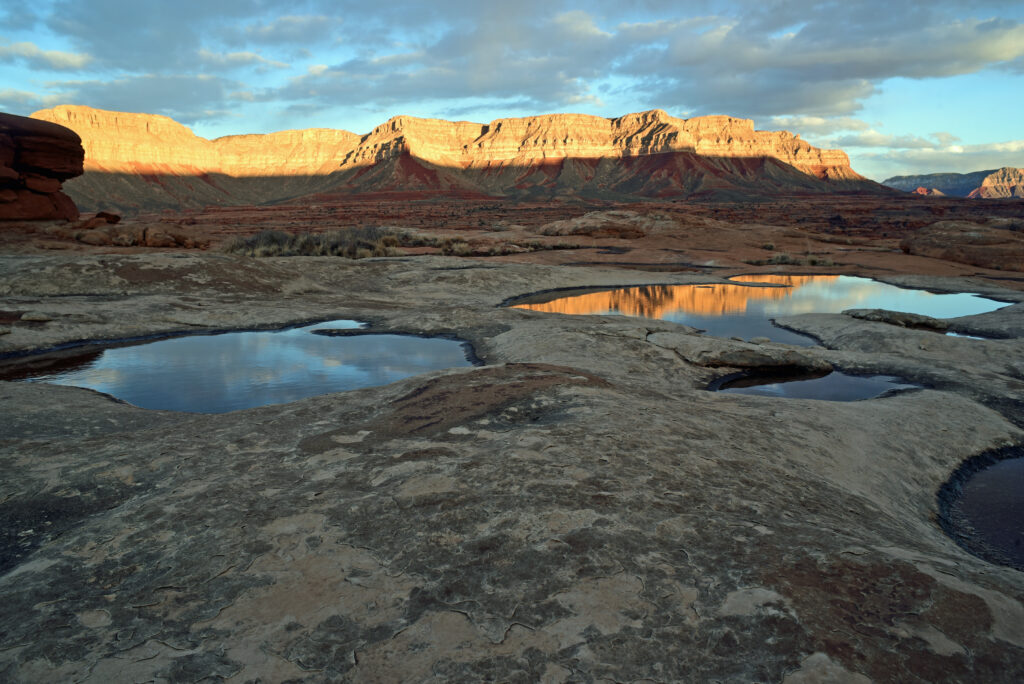
Most people assume that the device has changed, and nothing else. But we evolved as walkers, and today we cover ground quickly, race past one landmark to the next at breakneck speed, scrambling our internal map. Trains and planes hurl us past landmarks at a rapid pace. Cars and trucks take us to through the mountains in a blink. We grab a quick bite, check our phones, fill the tank, and we’re off to some trailhead. Along the way we hear nothing but the engine’s drone, the tires purring on asphalt, a little talk, some music. We taste nothing but road food – salty, greasy, or sweet, smell nothing but gas fumes at the pump. We feel nothing but the sun pounding on the windshield, the air conditioning brushing against our skin, because feelings would slow us down.
Traveling the backcountry requires more than physical fitness. It requires mental clarity and toughness, judgment, the ability to pay attention and improvise, traits that have been diminished in our push-button society.
Zombie nation
The public at large considers backcountry travel a waste of time – too hard, too boring, out of fashion. These strike me as good observations, and anyone who says they have no interest in lugging a pack the size of an overfed Labrador will get no argument from me. But I draw the line when I hear people call backpacking elitist, or a kind of escapism. Our society has elevated escapism to an industrial scale, with everything in our lives manufactured, virtual, digital, convenient, climate controlled, prepackaged. This has consequences – a warming planet, mass extinction, the natural world shrinking by the day. Peacock was right: getting lost is a privilege. Wandering the bush and sleeping on the ground does not allow us to escape from the real world but to experience what’s left of it.
Cell phones have finished what television started – a zombification of the masses.
The problem goes beyond technology, or lack of technology, and falls on people. Zombie Nation does not have a wilderness ethic, or outdoor experience, or common sense. People fall to their deaths, taking selfies at Grand Canyon. They drive to the edge of a cliff and nearly tumble off, because that’s what their phone tells them to do. Social media can turn a quiet little backwater into a major destination overnight. Ditches and trailheads fill with discarded bottles, shitpaper, cans, and plastic bags. Forest rangers and Search and Rescue teams must clean up the mess.
•••
Scree slopes and briar patches
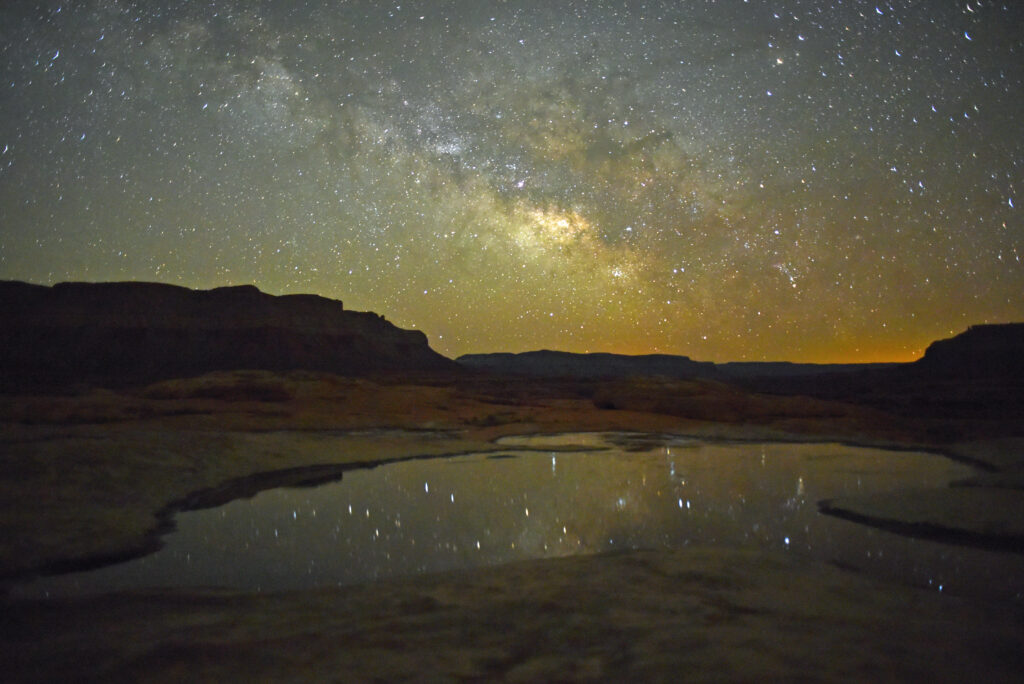
A corner of my office fills with topographic maps, rolled up and ready to stash in a pack, two-dimensional likenesses of peaks and valleys – the Weminuche, the Mogollons, the Henrys, the Gila, the South San Juans, the Colorado Plateau. Somehow, from time to time I lose my way, get off trail or off route, take the path to nowhere. Still, a map can come in handy. It can help me change course or backtrack, for instance, or my friends can roll it up and whack me over the head with it when we miss a turn.
Years go by and my internal map takes shape. It has evolved into a field guide to scree slopes, fishing holes and briar patches, a life. Places on paper maps have grown into memories of time on the ground, far-flung camps, with various miscues and scenic routes along the way.
The 10 essentials
Someone once told me that you can know exactly where you are in the Grand Canyon and still wind up in the wrong place. Another person told me his theory on mistakes and bad luck: You can generally survive one or the other, but maybe not both. Someone else again was talking about the list of 10 essential items – knife, map, first aid kit, compass, rain jacket, flashlight, matches and so on – that you should always bring outdoors, even on a day hike. Add judgment, he said. Sure. Maybe some extra water, duct tape, and a sense of humor.
An easy hike can turn into a wilderness experience if you lose your way. I’ve been lucky. I’ve had some great companions over the years, and I have always had food and water as twilight slipped away to darkness. I have been lost in silence and in thought, turned around, off trail and off course, dirty and tired, shambling along, slump-shouldered and bone-weary when shadows grow long, but I’ve always found my way, stars above, sandstone below, the air clean and crisp and holy shit, what a sunset.